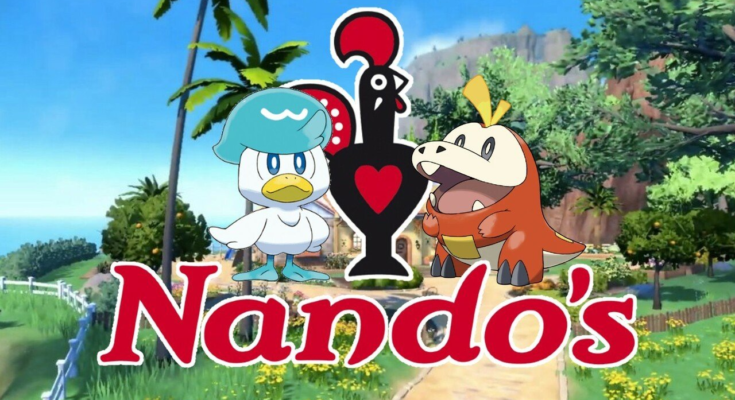

Fan theories tend to range from the irritating (“My dad’s dentist knows a guy at Nintendo who says there’s a new F-Zero game but it won’t be about racing”) to the inoffensively silly (“Luigi is the stronger brother, why does he not simply eat Mario”). Today’s rumour is closer to the “inoffensively silly” end of the spectrum, but nevertheless, we feel the need to debunk it all the same. Get ready for the most pedantic rumour-busting you’ve ever seen!
So: Are Pokémon Scarlet and Violet inspired by a trip that the developers took to the infamously cheeky Afro-Portuguese chicken restaurant (and accidental bastion of British culture), Nando’s? Let’s find out.
To start with, we need to establish one important thing: The Pokémon games are based on real-life locations, usually entire countries, but sometimes regions — X & Y’s Kalos is based on France, Sword & Shield’s Galar is the UK, Black and White’s Unova is New York City. Generation 9, Pokémon Scarlet and Violet, appears to be based on the Iberian Peninsula — which incorporates Spain, Portugal, Andorra, southern parts of France, and all the various regions within, from the Basque region to Occitania.
In a Twitter thread that is specifically described as “for fun”, Pokémon fan Eclipse lists a number of similarities between the Nando’s menu and aesthetic influences, and Pokémon Scarlet and Violet’s announcement trailer.
It all began when Junichi Masuda, the longtime producer and director on the Pokémon games, tweeted about a Nando’s visit back in 2019, which could well have been within the game’s research period:
So we have a verified connection between the two, which is a good start. We do love a good and thorough investigation that involves evidence.
The first similarity is the “Rooster Pokémon”, an unconfirmed monster that may or may not be based on the Barcelos Cockerel — the logo of Nando’s restaurant, which in itself is a real semi-legendary creature in Portugal that has come to represent faith and luck, and is often sold as a souvenir in the country. Already, we’re seeing a trend: The inspiration comes from Portugal, not necessarily Nando’s. It’s just that Nando’s — a restaurant that sells Portuguese-style chicken — is also inspired by Portugal.
Next, Eclipse compares the two fonts used by Nando’s to the two fonts used for Scarlet and Violet, suggesting that they are the same — a fact debunked by VGC, who says: “While they are similar, they aren’t actually the same font. Nando’s currently uses a custom-designed font known that was designed by South African sign-writer Marks Salimu.”

The design for Fuecoco, one of the starter Pokémon for the two new games, is inspired by a chili pepper — and, of course, Nando’s uses chili peppers in their cooking and their marketing, so the theory states that Fuecoco was inspired by some spicy chicken. But Portugal and South Africa, the two countries that Nando’s is inspired by, use chili peppers in their cooking, too. That’s where Nando’s signature spicy African Birdseye Pepper Piri-Piri sauce comes from! Besides, people who know Spanish cuisine better than we do have theorised that the Fire-type lad is most likely a cheese-stuffed piquillo pepper, anyway.
Finally, we have the fruit part of the theory, which points out that Nando’s drinks menu heavily features oranges, grapefruit, and pomegranates, “all [of which] are basically Scarlet/Violet colors”, and that the Pokémon Scarlet and Violet trailer features oranges and grapes. Let’s move past the fact that grapes and grapefruits are not the same, and focus instead on the fact that Nando’s did not invent oranges or grapes — they are both fruits that are important to the agriculture and economy of Spain, which seems to be the major inspiration for the game.
Now, don’t get us wrong — we do actually love fan theories, and this one is fun, especially because it involves spicy chicken, yum yum.
But if a theory is founded on the idea that similarities between two things can be more easily explained by one being inspired by the other, rather than the two having a shared inspiration, and the theorist entirely ignores the existence of Portugal, then we just can’t let it slide! Portugal gets neglected enough in the video game industry as it is, with Portuguese translations still being a very rare thing to see. We love theories, and we love Nando’s… but we love Portugal more.



